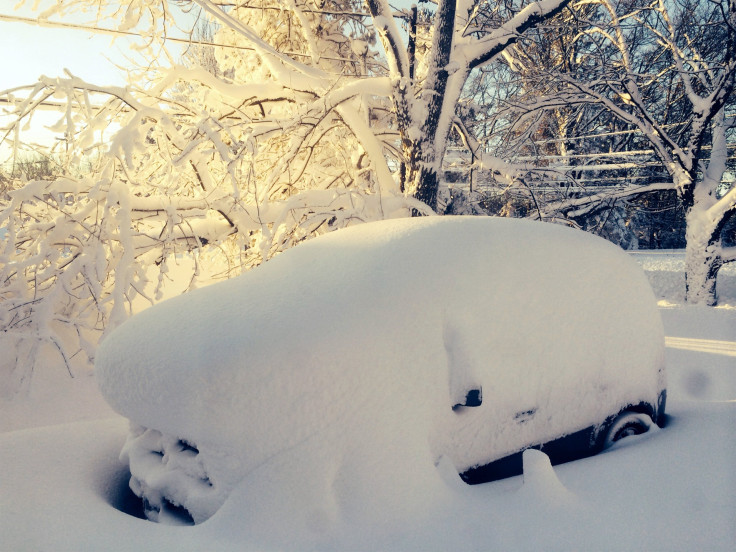Why Is It So Cold And Snowy In November? Blame Global Warming

The first major Northeastern snowstorm of the season dumped five feet of snow in some areas of upstate New York and record low Nov. 19 temperatures were shattered in many states Tuesday, kicking off what many forecasters say will be a tough winter for much of the country. Shifting weather patterns caused in large part by global warming -- which causes changes in air pressure and other dynamics that drive air to flow differently -- were a key cause of Tuesday’s staggering snowfall in Buffalo and other areas of upstate New York near the Great Lakes, according to Thomas C. Peterson, a principal scientist at the National Oceanic and Atmospheric Administration's National Climatic Data Center.
“The cold air came down from Canada so early in the year, so the Great Lakes were still so warm,” Peterson, who also serves as president of the World Meteorological Organization’s Commission for Climatology, said. “If the same cold air came in January, the Great Lakes would’ve been a lot colder than they are now in November, so now in November is when we’re getting all these really heavy lake-effect snows from this storm.”
Evidence shows that as global average temperatures rise, the phenomenon causes changes in weather patterns that are leading to colder winters in localized areas of the world, such as the much-publicized “polar vortex” that brought cold northern air to much of the U.S. last year and is being echoed this week. Monthly global average temperatures have been higher than the 20th century average for each of the past 355 months, and September was the warmest September globally since such records were first kept in 1880, according to NOAA.
“Because it’s warmer it also affects atmospheric patterns in the jet stream, how the jet stream moves across the U.S. … The jet stream is diverging way up into Canada, where it’s very cold, and after the northerly turn it takes a southern dip,” John M. Zobitz, a mathematics professor at Minnesota’s Augsburg College who specializes climate change, said. “As the temperature changes, you’re going to change patterns of precipitation and some places are going to end up being wetter on average than what they have been and some are going to be drier.”
That means just because Americans are feeling the chill this week, that does not mean that people in other places around the world have not experienced temperature spikes that, when combined with any isolated areas of low temperatures, average out to an overall pattern of a warming globe.
“Yes, the globe is warming in temperature, but that means some places are warm a lot more, and some places are sometimes colder,” Zobitz said. “We happen to be on the cold side of that right now, and no matter how you want to slice and dice it, that’s the reality.”
In what has become something of a holiday tradition, the early round of severe wintry weather has been met by a chorus of global warming deniers crowing about how snow and freezing winds demonstrate that climate change is little more than a liberal hoax.
“Global warming strikes America! Brrrr!” U.S. Rep. Vicky Hartzler, a Missouri Republican, joked Tuesday via Twitter, echoing similar sentiments by climate skeptics from all walks of life.
But most climate experts and scientists say that such jibes and declarations should be ignored, as the science in fact shows that the Earth continued to heat up this year. The snowstorms and cold spell that befell the nation Tuesday may seem to provide a counterpoint to that fact, they say, but just because there is snow in November doesn’t mean that climate trends show anything less than a steady rise in average global temperatures.
“If it’s cold in the small area where you may live, that doesn’t disprove global warming, and if it’s hot that doesn’t prove global warming,” Peterson said. “If you want to look at global warming, you want to look globally and at global averages. And as for global averages this year, I’d be very surprised if 2014 is not the warmest on record. It’s currently the warmest to date as of October, and something very strange would have to happen for it to not be the warmest year on record.”
Facts like these go against the narrative pushed by energy companies, conservative think tanks and right-leaning politicians and others who seek to discredit global warming and climate change.
One such organization is the Cornwall Alliance for the Stewardship of Creation, a conservative Christian think tank that has denied the existence of global warming. The group argued in a 2009 statement called "An Evangelical Declaration on Global Warming" that any temperature increases or changes in precipitation patterns in recent years are the result of “one of many natural cycles of warming and cooling in geologic history,” not systemic global warming caused in large part by humans.
“[T]here is no plausible reason to blame cold winters on global warming, except the desire to blame everything on global warming,” E. Calvin Beisner, the alliance’s founder and national spokesman, said via email. “[W]hat’s being experienced in Buffalo right now is, yes, more than average snowfall, but not beyond what one might expect to occur from time to time as just part of the normal fluctuation of the chaotic non-linear fluid dynamic global, regional, local climate/weather system.”
© Copyright IBTimes 2024. All rights reserved.





















